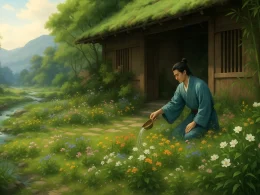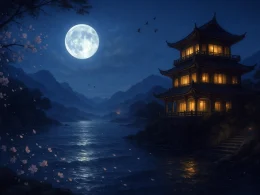Mulberry's fiber-optic cables go dark,
While AI-chinaberries bloom in the server park.
Wind pirates residual pollen-data—
Cyborg orioles crash my nap's beta.
Does my half-hill NFT still own my meta?
Original Poem
「书湖阴先生壁 · 其二」
王安石
桑条索漠楝花繁,风敛余香暗度垣。
黄鸟数声残午梦,尚疑身属半山园。
Interpretation
Composed between 1079 and 1082 during Wang Anshi's retirement at Half-Hill Garden in Jinling's Zhongshan Mountain, this wall-inscribed poem was written for his neighbor Yang Defeng, the Recluse of Lake Yin. Part of a poetic exchange, it depicts the natural surroundings of Yang's residence to reflect his noble character and refined tastes, while simultaneously expressing Wang's own tranquil state of mind after withdrawing from worldly affairs. Blending lyrical imagery with profound sentiment, the poem creates lingering resonance through its understated elegance.
First Couplet: "桑条索漠楝花繁,风敛余香暗度垣。"
Sāng tiáo suǒ mò liàn huā fán, fēng liǎn yú xiāng àn dù yuán.
Mulberry branches languish sparse and sere,
while chinaberry blooms burst dense and fair.
The fading breeze gathers lingering fragrance,
stealing unseen past the courtyard wall.
This couplet paints a midsummer garden scene rich in contrasts. The withering mulberry (桑条索漠), with its thinning leaves and fading vitality, marks seasonal transition, while the flourishing chinaberry (楝花繁) represents nature's persistent exuberance. The imagery of fragrance borne on a dying breeze (风敛余香) crossing boundaries (暗度垣) operates on multiple levels: visually tracing scent's invisible path, temporally marking summer's progression, and metaphorically suggesting memory's subtle permeation of consciousness. The wall becomes both physical boundary and permeable membrane between present observation and past experience.
Second Couplet: "黄鸟数声残午梦,尚疑身属半山园。"
Huáng niǎo shù shēng cán wǔ mèng, shàng yí shēn shǔ bàn shān yuán.
A oriole's sudden song fractures noon repose—
in lingering dreams, Half-Hill still claims me.
Transitioning from external observation to internal reflection, this couplet explores the liminal space between wakefulness and dreaming. The oriole's call (黄鸟数声) acts as both auditory punctuation to siesta and metaphorical awakening to life's transience. The poet's lingering sense of belonging to Half-Hill Garden (尚疑身属半山园) despite physical presence elsewhere reveals retirement's psychological complexities—how chosen seclusion becomes inseparable from identity. The "broken dream" (残午梦) symbolizes interrupted idealism, while the persistent sense of belonging demonstrates how places shape consciousness beyond physical habitation.
Holistic Appreciation
This deceptively simple quatrain moves through three psychological states: observation (garden scenery), transition (birdcall), and dislocation (dream confusion). Wang masterfully employs botanical and ornithological details to explore temporal and existential themes—the mulberry's decline versus chinaberry's vigor embodying life's simultaneous decay and renewal; the stolen fragrance representing memory's intangible persistence; the oriole's cry marking time's irreversible flow.
The poem's brilliance lies in its structural mirroring: just as scent crosses the physical courtyard wall, the dream state breaches the psychological wall between past and present. This dual permeability suggests that true retirement involves not just physical withdrawal but continuous negotiation between memory and immediacy. The recluse's garden becomes a palimpsest where nature's cycles are overwritten with human nostalgia.
Artistic Merits
- Symbolic botany
The mulberry and chinaberry transcend literal description to represent competing temporal forces—entropy versus vitality, past versus present. - Sensory layering
Visual (sparse/thick foliage), olfactory (stolen fragrance), and auditory (oriole's call) elements create immersive atmosphere while advancing thematic depth. - Oneiric temporality
The noon dream's rupture and persistent "sense of belonging" (尚疑) blur chronological boundaries, exemplifying Wang's late-period interest in subjective time. - Architectural metaphor
The courtyard wall functions both as physical barrier and psychological threshold, echoing Tang-Song philosophical debates about inner/outer worlds.
Insights
Wang's poem reveals retirement's paradoxical nature—how physical withdrawal to places like Half-Hill Garden creates not escape but deeper entanglement between environment and identity. The "lingering dream" suggests that chosen seclusions become inescapable parts of the self, their memory permeating consciousness like fragrance through walls.
For contemporary readers, this work offers meditation on how places haunt us. Just as Wang's Half-Hill Garden persists in dreams, our own meaningful spaces—childhood homes, significant landscapes—continue shaping us beyond physical presence. The poem ultimately questions whether we inhabit places or they inhabit us, presenting retirement not as conclusion but as ongoing dialogue between person and environment.
The oriole's call thus becomes more than nature's interruption; it's time's reminder that all dwellings—whether mulberry gardens or life stages—are temporary waystations where fragrance lingers just moments before crossing into memory.
About the Poet

Wang Anshi (王安石 1021 - 1086), a native of Linchuan in Jiangxi, was an outstanding statesman, writer, and thinker of the Northern Song Dynasty, counted among the "Eight Great Prose Masters of the Tang and Song Dynasties." His poetic achievements were particularly profound—his early works, filled with heroic language, revealed the ambition of a reformer. Though his ci poetry was few in number, it pioneered new realms of historical reflection. His poetry and prose combined intellectual depth with artistic value, and the over 1,500 works preserved in The Collected Works of Linchuan stand as a monumental testament to literary innovation in Song Dynasty literature.












